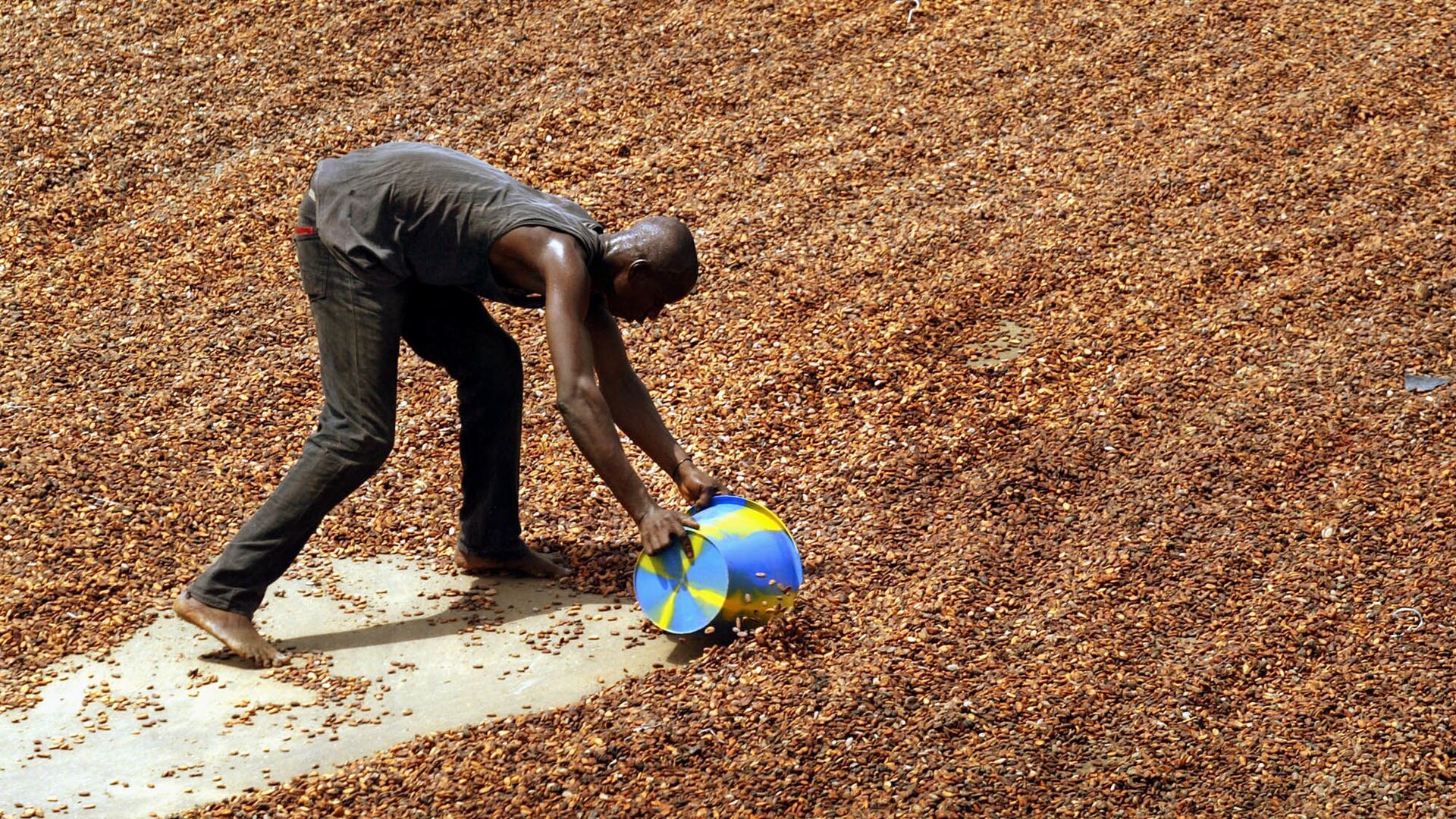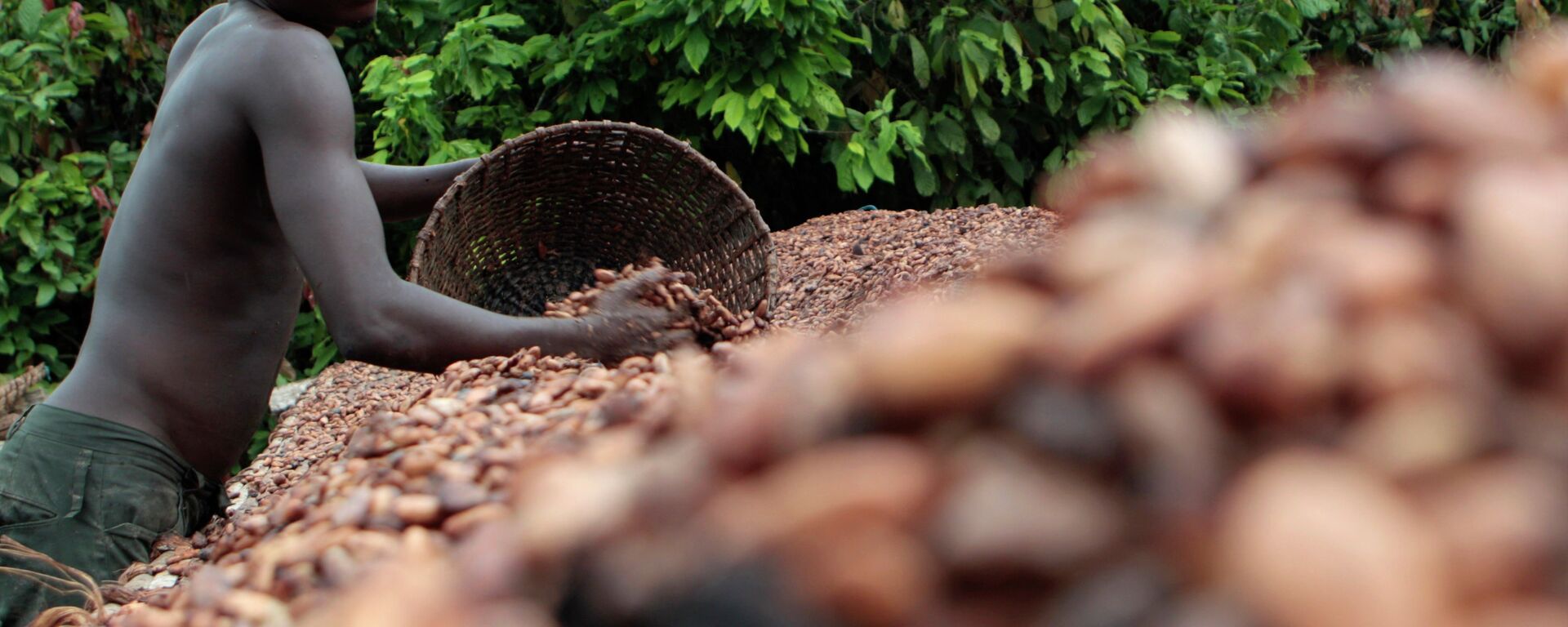https://en.sputniknews.africa/20240529/unfairness--inequity-experts-comment-on-economic-condition-of-cocoa-farmers-in-africa-1066782451.html
'Unfairness & Inequity:' Experts Comment on Economic Condition of Cocoa Farmers in Africa
'Unfairness & Inequity:' Experts Comment on Economic Condition of Cocoa Farmers in Africa
Sputnik Africa
The cocoa market is experiencing upheaval as prices reach new high, caused by numerous issues impacting major producers in West Africa, specifically Cote... 29.05.2024, Sputnik Africa
2024-05-29T10:34+0200
2024-05-29T10:34+0200
2024-05-29T14:04+0200
opinion
ghana
new york
africa insight
cote d'ivoire (ivory coast)
cocoa
farmers
agriculture
west africa
west
https://cdn1.img.sputniknews.africa/img/07e8/04/10/1066101688_0:88:2000:1213_1920x0_80_0_0_95c27c2c45a25001d93775666a1c61e3.jpg
The majority of cocoa farmers are running their businesses at a loss because the prices paid to them by chocolate companies are low, the Head of the Ghana cocoa marketing company, Fuad Abubakar Mohammed, told Sputnik Africa.Speaking about the ways to overcome this "inequity," the head of the company noted that it is necessary to set a minimum price for physical cocoa, which should not be less than $4,000-5,000.The "unfairness" of the economic condition of the African cocoa farmers was also highlighted by another Sputnik Africa's interlocutor - a cocoa farmer and networking coordinator for the Cocoa Farmers Cooperative Association of Ghana, Issifu Issaka.As for another way to improve cocoa farmers' economic condition, he welcomed the Cote d'Ivoire-Ghana cocoa initiative. In 2018, the presidents of the two countries, which jointly produce about 60% of global cocoa production, established a cocoa cartel to raise cocoa prices with a view to helping increase payments to farmers.It is also planned to create regional standards for the Africa commodity exchange, which will allow determining the price of cocoa within the continent's market "not at the New York exchange or the London exchange where cocoa is not produced, but they have the powers to determine the price of cocoa," Issaka added.In addition, he noted that climate change has a major negative impact on cocoa farming; therefore, "farmers should receive climate change adaptation practices."In January, the International Cocoa Organization (ICCO) revealed that the global cocoa bean deficit, which is caused by low yields in West Africa, is expected to persist until 2024. The low yields are attributed to the El Niño weather phenomenon, which is characterized by elevated sea surface temperatures in the Pacific Ocean. This phenomenon impacts global climate patterns, leading to increased temperatures and significant rainfall in the affected region.In March, the cost of cocoa beans, which has been steadily increasing for the past two years, reached record highs, surpassing $10,000 per tonne for the first time in history, and peaked on April 19 at $11,878 per tonne. However, in early May, cocoa bean futures decreased to $8,850 a tonne, according to ICE Futures data. This is still three times higher than in August 2022, though.
https://en.sputniknews.africa/20240430/nestle-program-to-increase-income-of-bean-farmers-in-africa-leaves-workers-below-living-wage-report-1066301511.html
ghana
new york
cote d'ivoire (ivory coast)
west africa
west
Sputnik Africa
feedback@sputniknews.com
+74956456601
MIA „Rossiya Segodnya“
2024
Rasina Musallimova
https://cdn1.img.sputniknews.africa/img/07e7/0a/17/1063019139_0:0:646:646_100x100_80_0_0_348c74b69cf86748a53875f8148a2f85.jpg
Rasina Musallimova
https://cdn1.img.sputniknews.africa/img/07e7/0a/17/1063019139_0:0:646:646_100x100_80_0_0_348c74b69cf86748a53875f8148a2f85.jpg
News
en_EN
Sputnik Africa
feedback@sputniknews.com
+74956456601
MIA „Rossiya Segodnya“
Sputnik Africa
feedback@sputniknews.com
+74956456601
MIA „Rossiya Segodnya“
Rasina Musallimova
https://cdn1.img.sputniknews.africa/img/07e7/0a/17/1063019139_0:0:646:646_100x100_80_0_0_348c74b69cf86748a53875f8148a2f85.jpg
ghana, new york, africa insight, cote d'ivoire (ivory coast), cocoa, farmers, agriculture, west africa, west
ghana, new york, africa insight, cote d'ivoire (ivory coast), cocoa, farmers, agriculture, west africa, west
'Unfairness & Inequity:' Experts Comment on Economic Condition of Cocoa Farmers in Africa
10:34 29.05.2024 (Updated: 14:04 29.05.2024) The cocoa market is experiencing upheaval as prices reach new high, caused by numerous issues impacting major producers in West Africa, specifically Cote d'Ivoire and Ghana. Though prices have slightly decreased since the end of April, they continue to be elevated.
The majority of cocoa farmers are running their businesses at a loss because the prices paid to them by
chocolate companies are low, the
Head of the Ghana cocoa marketing company, Fuad Abubakar Mohammed, told
Sputnik Africa."If you look at the value of the chocolate chain, farmers receive globally less than 10%. And that is a challenge. If we want to address this unfairness or inequity, it is important for the chocolate industry. And this is an oligopolistic market where you have just a few players controlling a dominant market share, both within the chocolate industry and within the processing or industrial chocolate space," he said.
Speaking about the ways to overcome this "inequity," the head of the company noted that it is necessary to set a minimum price for physical cocoa, which should not be less than $4,000-5,000.
"Industry and producers need to come together and say that cocoa needs to be de-commoditized. Minimum pricing for physical cocoa should be nothing less than $4,000 to $5,000. [...] The fundamental thing is the economic sustainability of the farmer," he underlined.
The "unfairness" of the
economic condition of the African cocoa farmers was also highlighted by another
Sputnik Africa's interlocutor -
a cocoa farmer and networking coordinator for the Cocoa Farmers Cooperative Association of Ghana, Issifu Issaka."Cocoa farmers are not looking good at all as compared to chocolates or chocolate companies who have been making billion dollar profit, hundred million dollar profit and the rest of cocoa farmers are still in poor condition based on systems that are being run against them," Issaka underlined.
As for another way to improve cocoa farmers' economic condition, he welcomed the
Cote d'Ivoire-Ghana cocoa initiative. In 2018, the presidents of the two countries, which jointly produce about 60% of global cocoa production, established a cocoa cartel to raise cocoa prices with a view to helping increase payments to farmers.
It is also planned to create regional standards for the Africa commodity exchange, which will allow determining the price of cocoa within the continent's market "not at the New York exchange or the London exchange where cocoa is not produced, but they have the powers to determine the price of cocoa," Issaka added.
In addition, he noted that climate change has a major negative impact on cocoa farming; therefore, "farmers should receive climate change adaptation practices."
In January, the International Cocoa Organization (ICCO) revealed that the
global cocoa bean deficit, which is caused by low yields in West Africa, is expected to persist until 2024. The low yields are attributed to the El Niño weather phenomenon, which is characterized by elevated sea surface temperatures in the Pacific Ocean. This phenomenon impacts global climate patterns, leading to increased temperatures and significant rainfall in the affected region.
In March, the cost of cocoa beans, which has been steadily increasing for the past two years,
reached record highs, surpassing $10,000 per tonne for the first time in history, and peaked on April 19 at $11,878 per tonne. However, in early May, cocoa bean futures
decreased to $8,850 a tonne, according to ICE Futures data. This is still three times higher than in August 2022, though.



